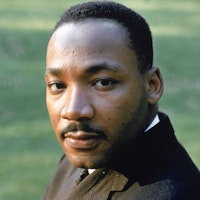Everybody can be great because everybody can serve. You don’t have to have a college degree to serve… You only need a heart full of grace, a soul generated by love.
Martin Luther King Jr.

A Heart Full of Grace
Topic: Serving Others
And so Jesus gave us a new norm of greatness. If you want to be important—wonderful. If you want to be recognized—wonderful. If you want to be great—wonderful. But recognize that he who is greatest among you shall be your servant. That’s a new definition of greatness. And this morning, the thing that I like about it: by giving that definition of greatness, it means that everybody can be great because everybody can serve. You don’t have to have a college degree to serve. You don’t have to make your subject and your verb agree to serve. You don’t have to know about Plato and Aristotle to serve. You don’t have to know Einstein’s theory of relativity to serve. You don’t have to know the second theory of thermodynamics in physics to serve. You only need a heart full of grace, a soul generated by love. And you can be that servant.
Martin Luther King Jr. was born on January 15, 1929, in Atlanta, Georgia, as Michael Luther King Jr., but later changed his name to Martin. He came from a family of pastors, with his grandfather and father both serving as pastors at the Ebenezer Baptist Church. Martin Luther King Jr. attended segregated public schools and graduated from high school at the age of fifteen. He went on to earn his B.A. degree in 1948 from Morehouse College, where his father and grandfather had also graduated.
After completing three years of theological study at Crozer Theological Seminary, where he was elected president of a predominantly white senior class, King received his B.D. degree in 1951. He then pursued graduate studies at Boston University, where he met and married Coretta Scott. King completed his doctorate in 1955 and had two sons and two daughters with Coretta. Throughout his life, Martin Luther King Jr. played a crucial role in the civil rights movement, advocating for racial equality and justice through nonviolent means. His leadership and inspiring speeches, such as his famous "I Have a Dream" speech, made him a prominent figure in the fight against segregation and discrimination. In 1964, he was awarded the Nobel Peace Prize for his efforts to promote peaceful change and equality for African Americans. Tragically, Martin Luther King Jr. was assassinated on April 4, 1968, but his legacy as a champion of civil rights continues to inspire people around the world.
Dr. Martin Luther King, Jr. [The Drum Major Instinct (1968) Sermon at Ebenezer Baptist Church in Atlanta, Georgia (4 February 1968)].

Martin Luther King Jr.
Theme: Serving

About This Martin Luther King, Jr. Quotation [Commentary]
In his “Drum Major Instinct” sermon, Martin Luther King, Jr. offers a clear redefinition of greatness. “Everybody can be great,” he says, “because everybody can serve.” Drawing from the words of Jesus—“he who is greatest among you shall be your servant”—Martin Luther King, Jr. names service as the true measure of importance. The desire to be great, he says, is not wrong in itself; what matters is how greatness is understood. By giving a “new definition of greatness,” he opens a path that does not depend on status, recognition, or achievement.
Martin Luther King, Jr. repeats that service requires no special credentials: “You don’t have to have a college degree… You don’t have to make your subject and your verb agree… You don’t have to know about Plato and Aristotle… Einstein’s theory of relativity… the second theory of thermodynamics in physics to serve.” The conditions for service are instead inward: “You only need a heart full of grace, a soul generated by love.” In placing grace and love at the center, he affirms the accessibility of greatness to all people, regardless of education, wealth, or background.
“Everybody can serve,” he says—and so, “everybody can be great.” This reframing makes greatness available through the willingness to care, not through the pursuit of recognition. A heart shaped by grace and a soul energized by love are the only true requirements. Martin Luther King, Jr. leaves no one out. The call is not to rise above others, but to lift others up. By aligning greatness with service, he honors those whose acts of love may go unseen but remain essential.
The Drum Major Instinct (1968)
Sermon at Ebenezer Baptist Church in Atlanta, Georgia (4 February 1968) Dr. Martin Luther King, Jr.’s “Drum Major Instinct” sermon was an adaptation of the 1952 homily ‘‘Drum-Major Instincts’’ by J. Wallace Hamilton, a well-known, liberal, white Methodist preacher. King encouraged his congregation to seek greatness, but to do so through service and love. King concluded the sermon by imagining his own funeral, downplaying his famous achievements, and emphasizing his heart to do right.
Related Quotes
Copyright © 2017 – 2025 LuminaryQuotes.com About Us